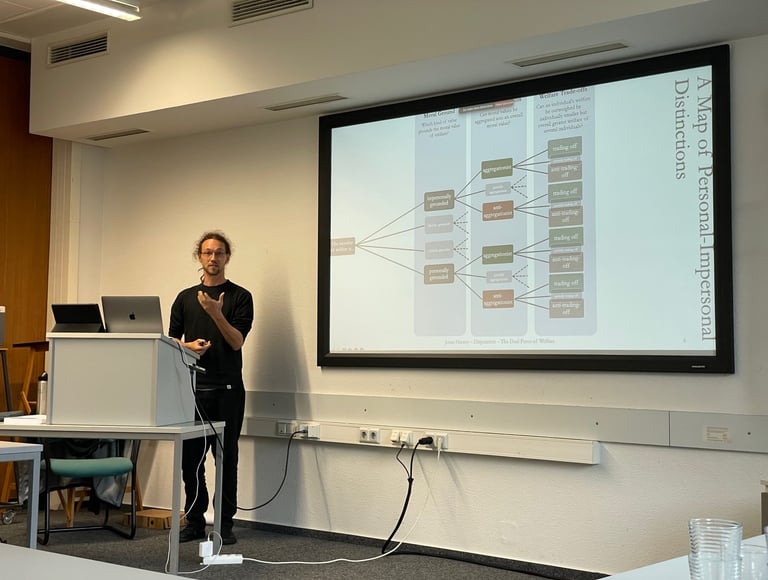Research
My research is mainly on normative ethics and moral theory – in particular welfare ethics, population ethics, moral aggregation, distributive justice, moral foundations, welfare trade-offs, and multiple-option choices. Recently, I also engage with these topics in decision theory.
For more detailed project descriptions and working papers, see below. If you’re interested in any of the working papers, feel free to reach out!
For a simple list of my publications see here.


Moral Theory and the Complexities of Multiple-Option Choices
How do moral theories handle choices between more than two – or multiple – options? The vast majority of the ethical literature discusses only cases in which the agent has two and only two options. Consider, for example, the debate about the aggregation of people’s welfare or their welfare claims. The famous examples – Scanlon’s (1998: 235) transmitter room, Temkin’s (2012: 34) life vs. lollipops, or the often used life for headaches (Norcross 1997: 135 and Horton 2018: 160, to name just two) – depict decisions between two and only two options: the agent can either provide one large benefit for one person, or much smaller benefits for a huge number of people. This suggests that multiple-option choices do not pose any particular problem for moral theory, and any principle formulated in terms of a comparison of only two options can be applied to multiple-option choices. However, this implicitly assumes that the moral status of actions depends solely on the intrinsic features of the action and its consequences (Temkin 2012: 2012: 229 and 369–370).
Many of our moral ideals, however, are essentially comparative: the moral status of actions can depend on the alternatives! This is so, for example, for the following views:
Comparative View: A person’s welfare loss provides in itself a moral reason to prevent that loss.
Relevance View: You ought to act such that we maximise the satisfaction of the relevant strength-weighted claims of individuals against welfare losses, where a claim is relevant if and only if it is sufficiently strong compared to some other claim with which it competes.
For such views, typical assumptions associated with intrinsic aspect views do not hold, for example, the transitivity of "ought to be chosen over" and the independence of the moral status of actions from further alternatives. Therefore, principles formulated only with respect to two alternative options do not suffice. Rather, we need to broaden our moral theories to choices with more than two options – we need theories that tell us which option we ought to choose if multiple options are available!
Paper Publications
2023. ‘How to Assess Claims in Multiple-Option Choice Sets’. Philosophy & Public Affairs 51 (1): 60–92. (Together with Jake Khawaja.) https://doi.org/10.1111/papa.12227
Working Papers
‘Welfare Losses in Variable Population Choices with Multiple Options’. Working Paper.
‘Global Reasons to Satisfy Locally Relevant Claims’. Working Paper.
‘Prospects of Welfare Losses’. Working Paper.
‘Prospects of Essentially Comparative Features‘. Working Paper.
The Dual Force of Welfare
Unravelling Personal and Impersonal Views in Welfare Ethics
Welfare matters morally! But how? Is the morality of welfare impersonal, focused on the good in the world and how to promote it? Or is the morality of welfare personal, concerned with particular people and how they fare? In this project, I’ve dealt with the distinction between personal views and impersonal views on the morality of welfare in three parts.
What precisely is the distinction between personal and impersonal views on the morality of welfare? Part I identifies and distinguishes the particular senses of both these notions. I develop a novel taxonomy of personal and impersonal views including (i) the agent-dependency of morality, (ii) the ground of the moral value of welfare, (iii) moral aggregation, (iv) interpersonal welfare trade-offs, (v) the morally relevant types of personal values.
Which view is plausible? Part II takes up the task of deciding between the personal and impersonal sides of the previously carved-out distinctions, respectively. I argue for the Dual Personal View of Welfare: Welfare has moral value if and only if, and if, then because, it has personal absolute or personal comparative value for the individual whose welfare it is. I also advocate a formal version of moral aggregation and argue that welfare trade-offs between individuals are either always or at least sometimes permissible.
How do we morally compare outcomes? In Part III, I explore a dual theory of outcomes comparisons based on the previous results: absolute welfare and comparative welfare make outcomes morally better and worse. I investigate various ways in which the dual theory can unfold. One core of that discussion is a novel interpretation of the Comparative View (better known as a narrow person-affecting view): welfare gains and losses set-wise considerations: they make outcomes morally better and worse relative to all outcomes in a fixed set of compared outcomes.
Books
forthcoming (probably in the end of 2026). The Dual Force of Welfare: Unravelling Personal and Impersonal Views in Welfare Ethics. Routledge.
Paper Publications
2023. ‘The Interpersonal Comparative View of Welfare: Its Merits and Flaws’. The Journal of Ethics 27 (3): 369–391. https://doi.org/10.1007/s10892-023-09436-7 (open access)
2026. 'The Dual Reason-Giving Force of Welfare: An Exploration'. Utilitas. First View, 1–21. https://10.1017/S0953820825100228 (open access)
forthcoming. 'Priority for Comparative, Not Absolute Benefits'. Moral Philosophy and Politics. Downloard preprint.
Working Papers
‘Taking Narrow Person-Affecting Considerations Seriously’. Working Paper.
‘Non-Existence Cannot Be Neutral for Anyone’. Working Paper.
‘The Ground of the Moral Value of Welfare’. Working Paper.
